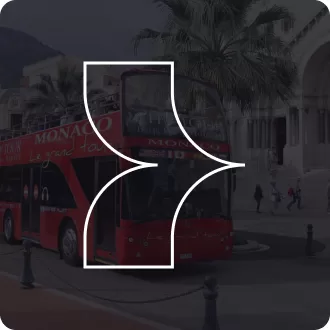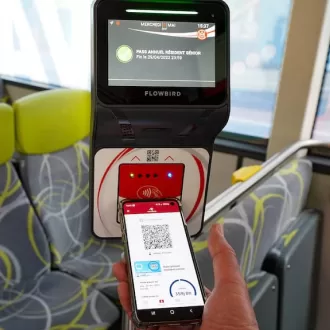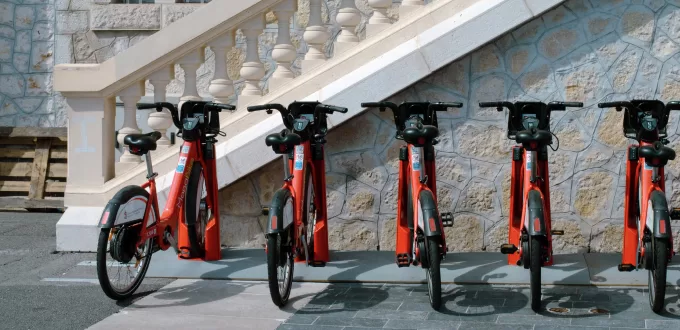In Flowbird’s latest ‘Let’s Talk About Transport’ podcast, Fred Laithier, the company’s Project Manager for Mobility-as-a-Service (MaaS), looks at the power of MaaS to transform the way that people live in and navigate cities and regions.
Chapter 1: Hear how MaaS has the power to change people’s behaviour and to encourage a transition towards sustainable mobility with all the environmental, economic and societal benefits this can bring.
Chapter 2: Discover how MaaS can help shape decisions beyond transport, as in Monaco, where around one third of initial in-app purchases are for leisure and cultural tickets, which can be bundled with transport services.
Chapter 3: Learn how Flowbird is engaged with the University of Pau and Pays de l’Adour and the CNRS in France to develop a scorecard to show the effect that an individual’s transport choices have on the environment and wider society.
“We already have many of the building blocks place to make MaaS the cornerstone of better transport networks,” says Fred. “For example, taken together, MaaS and open payments provide an essential foundation for creating truly liveable cities because they enable the use of a single token for multimodal travel as well as providing easy access to a range of associated services.”
“In effect, what we are talking about is one app to meet all the transport needs of an individual, which in turn becomes a powerful tool in helping authorities develop and apply policies that encourage people to make more sustainable travel choices.”
In episode 6 of this podcast, Fred talks about how the principal goal of MaaS is to change consumer behaviour, to encourage the transition towards sustainable mobility for environmental, economic, and societal benefit. Successful MaaS planning and implementation also requires a clear governance structure built on trust and strong partnerships between city authorities and operators, so that each participant benefits from incremental gains.
Incentivising adoption among citizens and visitors is also key to success… and here Fred articulates the gamification innovation underway between Flowbird and University of Pau that will not only ‘score’ the impact of mobility habits, but also incentivise sustainable travel through a reward system.



Soundbites:
Policy making: “For the city, MaaS allows them to easily apply and adjust their mobility policies through a common, trusted digital channel that has high adoption rates. It meets environmental, social, and economic challenges by reducing air pollution, congestion, increasing transport inclusion and also boosting business.”
Private vehicle integration: “The MaaS goal is to make a multimodal journey effortless. Many of these start with the car, so it’s important to attract drivers to the MaaS app to create awareness of other transport modes they can ride to reduce city centre congestion. Also, with the rise of EVs, MaaS can facilitate ‘park & charge’ – we are launching a new system for this.”
Value-added services: “We launched Monaco’s Monapass app in May 2021 with three mobility services – parking, public transportation, and bike sharing. Now, we have 11 services fully integrated into the platform, including museum and cinema tickets. And we’ve just launched the service for Monapass users to purchase soccer tickets and enter the AS Monaco stadium with the app.”
Driving behavioural change: “It’s not because there are more buses that you will leave your car in your garage. Incentivizing change could be a discounted price if you purchase a bus ticket with the museum ticket, but incentivization is not only about price or money. It also makes sense to include tourism and cultural services in the same app to be able to build a combined offer or earn some points if you use a bus 10 times a week or go to work by bike. These can then be converted into a discount, a free bus ticket or something else that the city wants to promote.”
Effortless mobility: “When you travel, when you take a bus or bike or a car, you want to go somewhere, you want to do something, you want to access a place, such as go to the cinema, to visit a museum, etc. The bus station, a bike station or a parking lot is just a step to your destination, so it makes sense to include the goal of your trip in the same user experience.
Users attracted by tourism or cultural services may then use mobility services. In Monaco, we see that more than 30% of first purchases are for activity tickets and the second purchase is for mobility services. All the journey is covered. It’s an effortless experience for citizens.”
Future MaaS & AI: “How MaaS will grow depends on many factors, including technology advancement, government regulation, market trends and user preferences. But I think that we will see more and more private companies use a MaaS platform for the mobility of their employees. Car use cases also will be more integrated into MaaS, like autonomous vehicles, electric charging, fleet management and of course parking management. Also, artificial intelligence will be a kind of game changer to improve demand prediction, route optimization and participation in the transport network.”
